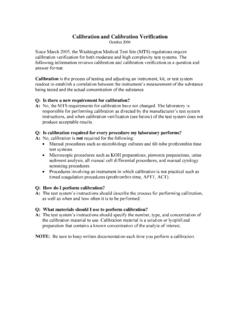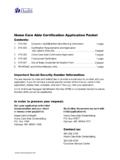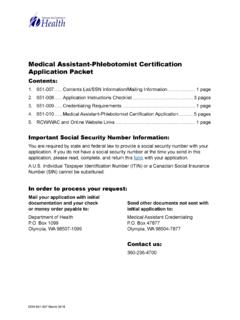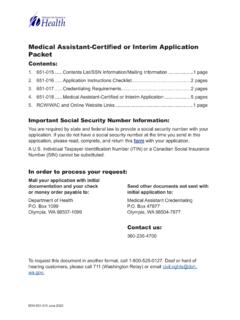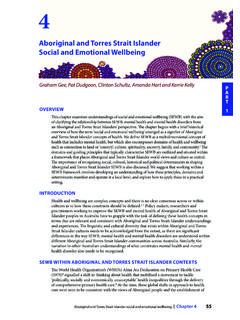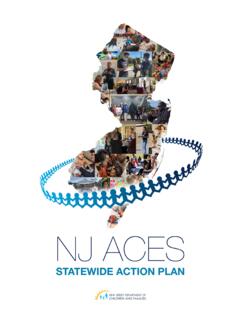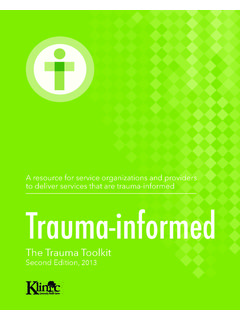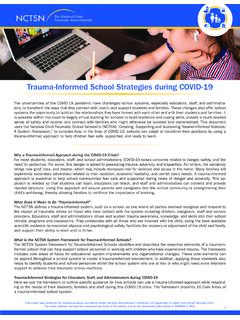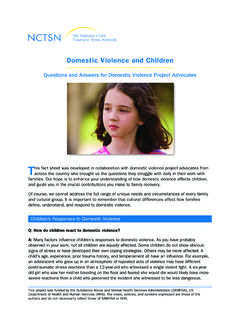Transcription of Coping with Grief and Loss During COVID-19
1 Coping with Grief AND loss During COVID-19 The COVID-19 pandemic is a public health disaster that has increased the burden of Grief and loss for many. A COVID-19 death has significant impacts and can affect on average nine grieving Researchers found that people grieving COVID-19 -related losses had more intense and worse symptom levels than those grieving other types of natural Those with more intense symptoms may also have lower levels of social support and more severe Grief ,4 This includes prolonged Grief disorder, a response to Grief that is often linked to depression, anxiety, and post-traumatic stress disorder. However, death of a loved one is not the only cause of Grief and loss . The COVID-19 pandemic has created multiple loss experiences for many, including job loss , diminished health, or the loss of our normal Additionally, the social and economic effects of the COVID-19 pandemic have caused more severe impacts on older adults and people of color.
2 Older adults may struggle with increased isolation and loss of support systems, such as faith communities and social Some people experience persistent stress or trauma related to ongoing injustice and oppression based on race, ethnicity, gender, sexual orientation, or other aspects of their identity. These experiences of stress and trauma are worsened by the pandemic. Many families will be Coping with Grief before life returns to normal. It may be helpful to find new ways of engaging in daily life activities to adapt after a loss . Finding creative solutions for increasing social support while certain gatherings and events remain restricted, including adjusting traditional Grief rituals and memorials, may also be helpful. MAY 2021 HEAL Model for Managing Grief and loss The HEAL model helps people cope with Grief and loss . The elements of the HEAL model are interchangeable and don t happen in any order.
3 It is common for people to go back and forth through many aspects of the Grief and loss process before getting to a place of peace and acceptance. Both those who are grieving and those who are helping can use this model. H = Honor the loss An important part of healing is to honor the memory of the person or experience. Honor the loss by participating in rituals, ceremonies, or other events, rather than avoiding memories. Give yourself time to process write in a journal, share stories, look at pictures, and reflect on memories. E = Express emotion There are no wrong emotions. Being angry is a common emotion that many people experience in Grief . In the case of the loss of a loved one, it is not uncommon for people to feel angry towards that person, and then feel guilty for being angry. This is normal, and it is ok to express these feelings. A = Acknowledge obstacles Acknowledge the obstacles that are slowing down the healing process.
4 Most people tell themselves things that prevent them from really accepting the loss . Acknowledging those obstacles can remove them and help with healing. Common obstacles that get in the way of acknowledging (and accepting) the loss include: Avoiding or denying the loss . Wishing things were different than they are. Wondering what could have caused a different outcome. L = Live Some days following a loss , all someone can do is make it through the day. Over time, as the healing process continues, it becomes important to focus on life and active living, rather than just surviving or existing. Focus on living by engaging, learning, participating, doing, and feeling. Signs of Grief Our unique cultural, familial, and past experiences affect how we each experience loss and show our Grief . People who are grieving may feel: Hollow Helpless Hopeless Sad These feelings are a clear sign that someone needs more support while grieving.
5 Helping with Grief and loss There is no right or wrong way or specific timeframe for processing Grief and loss . Each person has a different way of moving forward with recovery and building resilience . The losses we have experienced During this pandemic have limited our abilities to connect with others through empathy, compassion, and kindness. But when supporting a grieving person, try not to judge the way they express or experience their Grief . Instead, focus on validating and listening to the griever. And remember to be gentle with yourself as you support those working through Grief and loss . To support someone through Grief and loss , you can: Remain empathetic and listen patiently. Notice the griever s actions, gestures, and expressions to better understand what they are trying to convey. Try to sense what the grieving person is feeling. Check your understanding by summarizing what they ve shared.
6 Validate conflicting emotions. It s ok for someone to feel both loss and relief. Let the griever experience the thoughts and feelings about the loss . Give them space to grieve whom or what they lost. Encourage problem solving and decision making that prevents impulsive or risky decisions ( , precautionary health measures, burial decisions). Adjust Coping plans for grieving if traditional approaches aren t possible. For example, gather virtually to grieve with family. Know that Grief does not define the griever s identity. This can help the griever find a sense of calm and be more present. Encourage the griever to recognize what has been effective, doable, and uplifting in the past when experiencing Grief and loss . Identify places of belonging and positive relationships where the griever can find comfort and strengthen other aspects of their identity. Help the griever focus on simpler, more concrete tasks and activities that will increase their confidence in their decisions.
7 Share resources on Coping with Grief and loss , like this infographic, blog post, and podcast episode. Encourage the griever to seek help from their healthcare provider if they are having trouble with everyday activities. COVID-19 Behavioral Health Group Behavioral Health Strike Team Washington State Department of Health Web: Publication: 820-181 References 1. Verdery, A., Smith-Greenaway, E., Margolis, R., & Daw, J. (2020). Tracking the reach of covid 19 kin loss with a bereavement multiplier applied to the United States. Proceedings of the National Academy of Sciences of the United States of America, 117(30), 17695. 2. Eisma, M., Tamminga, A., Smid, G., & Boelen, P. (2020). Acute Grief after deaths due to COVID-19 , natural causes and unnatural causes: An empirical comparison. Journal of Affective Disorders, 278, 54-56. 3. PGD results in the person longing for and remaining preoccupied with the deceased for longer than six months, with the Grief exacerbated by intense emotional pain, and it results in functional impairment of personal, family, social, educational, occupational or other important areas of functioning.
8 World Health Organization. (2018). International classification of diseases for mortality and morbidity statistics (11th Revision). Retrieved from 4. Boelen, P. A., Lenferink, L. (2020). Symptoms of prolonged Grief , posttraumatic stress, and depression in recently bereaved people: symptom profiles, predictive value and cognitive-behavioral correlates. Social psychiatry and psychiatric epidemiology, 55(6), 765 777. 5. Maddrell, A. (2020). Bereavement, Grief , and consolation: Emotional-affective geographies of loss During COVID-19 . Dialogues in Human Geography, 10(2), 107-111. 6. Ishikawa, R. (2020). I may never see the ocean again: loss and Grief among older adults During the COVID-19 pandemic. Psychological trauma : Theory, Research, Practice, and Policy, 12(S1), S85 S86. COVID-19 Behavioral Health Group Behavioral Health Strike Team Washington State Department of Health Web: Publication: 820-181 To request this document in another format, call 1-800-525-0127.
9 Deaf or hard of hearing customers, please call 711 (Washington Relay) or email
